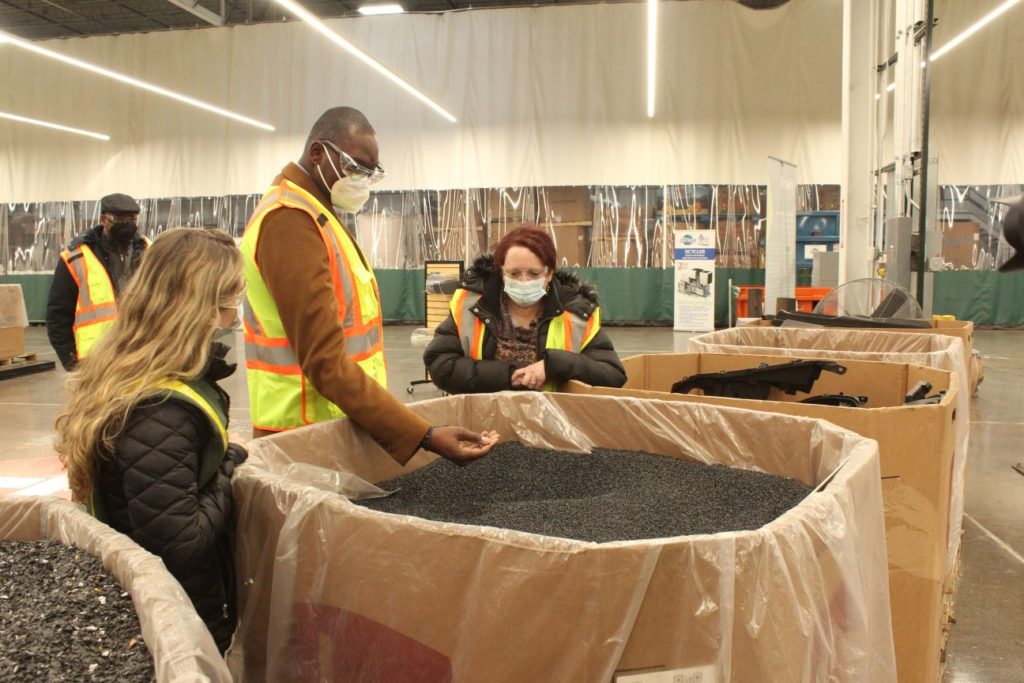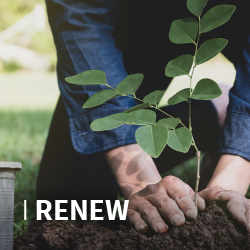On Friday, Feb. 25, Michigan Lt. Governor Garlin Gilchrist took a tour through the Holland, Mich.-based PADNOS Grand Rapids facility. The tour was led by Sam Padnos, Production Manager Todd Jousma, and PADNOS Sustainability Principal Kari Bliss.
Michigan is pursuing numerous sustainability policy initiatives and Gilchrist has stated his intentions for the state to serve as a leader in green sustainable efforts. “[ISRI] has talked with him not only about the essential nature of recycling in the circular economy but also had the opportunity to delve into specific issues including lithium-ion EV batteries,” says Danielle Waterfield, ISRI’s chief policy officer.
Waterfield was able to connect PADNOS with Gilchrest’s office during the company’s visit to the Michigan Capitol last year. At the meeting, the PADNOS team discussed their work in sustainability and the circular economy. They encouraged Gilchrest to come by for a visit and were very excited in February of this year to get the call from his staff that he was available for a tour.

“Overall, I was really pleased with how the tour went,” Bliss says. “We knew we only had 45 minutes, so we were intentional with what we showed him.” The PADNOS team walked Gilchrest through Sustainability City, the company’s 18,000 square-foot innovation space. With equipment designed for customers-scale rather than industry-scale, visitors can see exactly how their equipment will be used and perform on-site. “When you talk about these projects theoretically, it can be hard for people to wrap their heads around it and get buy-in from stakeholders,” Bliss says. “This space allows us to bring in those decision-makers and layout and run their materials, it’s a hands-on experience.”
The company recently used the space for a project from Michigan’s Department of Environment, Great Lakes, and Energy (EGLE) to recycle a large quantity of personal protective equipment (PPE), produced during the onslaught of COVID-19. “Unfortunately, there’s no easy way to recycle the gowns when you have this kind of volume,” Bliss explains. “They contacted us and brought the materials to Sustainability City. Our team conducted various tests and were able to find a solution to recycle the gowns. The space allows for work that doesn’t happen with day-to-day processing.”
When Gilchrest came over, Bliss wanted to show him the company’s work with auto shredder residue (ASR). “I would love for Michigan to be the premiere recycler of those plastics and [Gilchrist] agreed,” she says.
While PADNOS is largely known for recycling metals, Bliss hopes it can also be known for the way it processes plastics. “We offer diverse processing capabilities and our unique advantage to solve the ASR problem is that we already have the expertise in plastics,” she says. “On first glance auto shredder fluff may seem like waste because it doesn’t look appealing, but there really is value in it.” She sees PADNOS in the initial phases of this work and hopes to get to a point where the company can work with other recyclers to get their operations set up as well.
Bliss believes sustainability aligns well with the company’s purpose. “We will continue to innovate, lead and make a positive impact in this world, and that means making it sustainable. You’re continually improving and coming up with new innovations to make things possible that were previously impossible, we’re making the best uses of our resources whether that’s people, or environmental concerns, or the recycled materials themselves.”
PADNOS has several sustainability service offerings for customers. The three areas the company focuses on are material analysis and solutions, carbon reduction strategies, sustainability audits and recording.
Bliss believes Gilchrest left the tour with a better understanding not only of the circular economy but also that the circular economy has already been put into practice. While many companies are beginning to put time, effort, and resources into these projects, steps toward the circular economy have been happening many sectors for several years. “I think he was surprised to see just how much innovation has happened in that space,” Bliss says.
Though the tour lasted less than an hour, it was a valuable opportunity not only for Gilchrest to see PADNOS’ efforts, but also for the company. Bliss encourages recyclers to take legislators through their facilities and get active in the political space. “It’s like voting,” she says. “It might seem simple on the surface but it’s important to do. Activities like meeting legislators and conducting facility tours add up. If we want to have a say in legislation that’s passed and the way our industry is run people need to step up and do that work.”

For recyclers who may be nervous about connecting with legislators, Bliss says it’s a lot easier than it looks. “I’ve got great people around me to help. I think these efforts take more than one person,” she says. “Having different people who bring different skillsets to the table is very beneficial. You can cover more ground.” She also emphasizes that legislators want to talk to their constituents and are open to hearing their concerns.
“Knowing that I can reach out to his staff is going to be a benefit in the future,” she says. “Forming those relationships with legislators is crucial.”
Photos Courtesy of PADNOS.
Additional Resources













